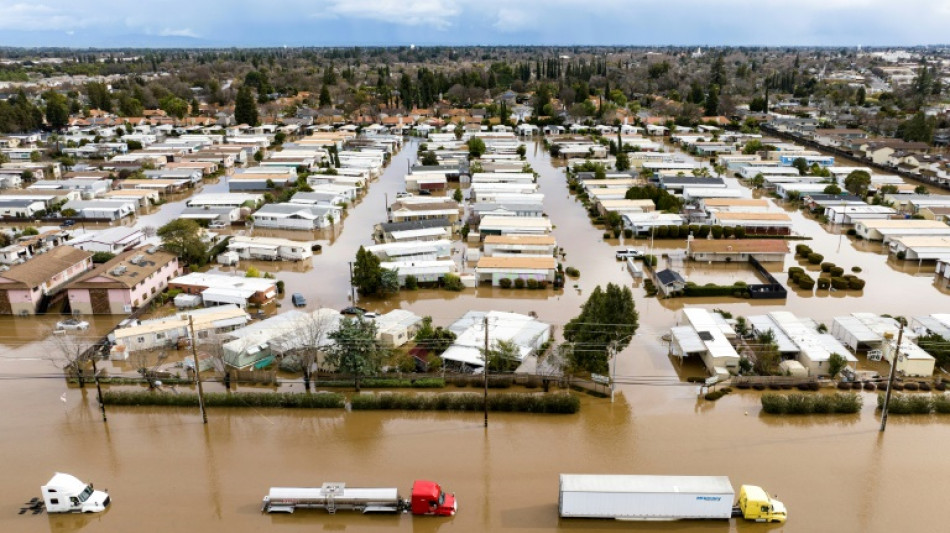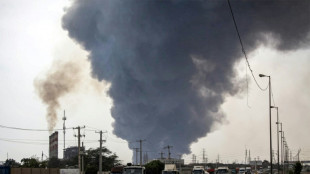
-
 Turkey's opposition says Erdogan's canal plan behind latest arrests
Turkey's opposition says Erdogan's canal plan behind latest arrests
-
Maresca hails 'nasty' Chelsea as top five bid stays alive

-
 Trump raises Putin doubts after Zelensky talks at pope's funeral
Trump raises Putin doubts after Zelensky talks at pope's funeral
-
Major blast at Iran port kills 4, injures hundreds

-
 Napoleon's sword to be sold at auction in Paris
Napoleon's sword to be sold at auction in Paris
-
Iran, US discuss nuclear deal in third round of talks

-
 Buenos Aires farewells native pontiff with call to action
Buenos Aires farewells native pontiff with call to action
-
Warholm sets hurdles world record at Diamond League, Holloway shocked

-
 US students 'race' sperm in reproductive health stunt
US students 'race' sperm in reproductive health stunt
-
Wikileaks founder Assange joins crowds for pope funeral

-
 Leader Marc Marquez claims Spanish MotoGP sprint victory
Leader Marc Marquez claims Spanish MotoGP sprint victory
-
Celtic win fourth successive Scottish Premiership title

-
 Jackson ends drought as Chelsea boost top five push
Jackson ends drought as Chelsea boost top five push
-
Warholm sets 300m hurdles world record in Diamond League opener

-
 Major blast at south Iran port kills 4, injures hundreds
Major blast at south Iran port kills 4, injures hundreds
-
Russia says retook Kursk from Ukraine with North Korean help

-
 Francis laid to rest as 400,000 mourn pope 'with an open heart'
Francis laid to rest as 400,000 mourn pope 'with an open heart'
-
Trump, Zelensky meet on sidelines of pope's funeral

-
 'Shared loss': Filipino Catholics bid Pope Francis farewell
'Shared loss': Filipino Catholics bid Pope Francis farewell
-
Families unable to reunite as India-Pakistan border slams shut

-
 Major blast at south Iran port injures hundreds
Major blast at south Iran port injures hundreds
-
Foreign carmakers strive for 'China Speed' to stay in race

-
 Pakistan says open to neutral probe into Kashmir attack after India threats
Pakistan says open to neutral probe into Kashmir attack after India threats
-
Hundreds of thousands at funeral mourn pope 'with an open heart'

-
 Quartararo sets Spanish MotoGP record to claim pole
Quartararo sets Spanish MotoGP record to claim pole
-
Hamas says open to 5-year Gaza truce, one-time hostages release

-
 Iran, US hold new round of high-stakes nuclear talks
Iran, US hold new round of high-stakes nuclear talks
-
Up at dawn for front-row seat to history at Francis's funeral

-
 Pakistan ready to 'defend sovereignty' after India threats
Pakistan ready to 'defend sovereignty' after India threats
-
Huge crowds flock to Vatican for Pope Francis's funeral

-
 Xi says China must 'overcome' AI chip challenges
Xi says China must 'overcome' AI chip challenges
-
Indian army says new exchange of gunfire with Pakistan

-
 Epstein accuser Virginia Giuffre takes own life in Australia: family
Epstein accuser Virginia Giuffre takes own life in Australia: family
-
Hundreds of buildings damaged, dozens injured in 6.3 Ecuador quake

-
 India and Pakistan's Kashmir fallout hits economy too
India and Pakistan's Kashmir fallout hits economy too
-
Francis's funeral to be grand farewell to 'pope of the poor'

-
 Pogacar faces defiant Evenepoel at Liege-Bastogne-Liege
Pogacar faces defiant Evenepoel at Liege-Bastogne-Liege
-
Chelsea eye great escape against Barcelona in Women's Champions League

-
 Iran, US to hold new round of high-level nuclear talks
Iran, US to hold new round of high-level nuclear talks
-
'Energy and effort' pay off for Reds as Blues' woes continue

-
 Albatross and closing birdie lift China's Liu to LPGA Chevron lead
Albatross and closing birdie lift China's Liu to LPGA Chevron lead
-
On the horizon? Wave of momentum for high seas treaty

-
 New to The Street Launches For The Causes(TM) Monthly Awareness Segments: Offering Free National Media to Charities and Organizations
New to The Street Launches For The Causes(TM) Monthly Awareness Segments: Offering Free National Media to Charities and Organizations
-
Top Mistakes to Avoid When Building Credit History

-
 Developing countries should fast-track US trade deals: World Bank president
Developing countries should fast-track US trade deals: World Bank president
-
Grizzlies' Morant 'doubtful' for must-win game 4 v Thunder

-
 Trump in Rome for pope funeral in first foreign trip of new term
Trump in Rome for pope funeral in first foreign trip of new term
-
Trump says Russia-Ukraine deal 'very close' after new Kremlin talks

-
 US rookies lead PGA pairs event with McIlroy and Lowry in hunt
US rookies lead PGA pairs event with McIlroy and Lowry in hunt
-
Trump tariff promises get a reality check


California downpours won't fix decades of drought: scientists
Near-record rainfall has battered California for weeks, sparking floods and landslides as the state struggles to cope with so much water.
But scientists say even this much precipitation won't reverse the western US state's decades-long drought.
A parade of atmospheric rivers -- massive flows of moisture dragged through the skies from the oceans -- has unleashed staggering volumes of rain and snow since December.
San Francisco got more rain in the last two weeks than it has done in any similar period for 150 years, while the Sierra Nevada mountains have been buried in as much as 33 feet (10.5 meters) of snow.
Peter Gleick, co-founder of the Pacific Institute in Oakland, a research organization that specializes in water issues, says it's difficult to quantify exactly how much water has fallen from the sky.
"But we're definitely talking about trillions of gallons (liters)," he told AFP.
"There's no doubt that the water we're getting now is a great help in eliminating the drought... But it is too soon to say that the drought is over."
"2023 could be a wetter year than normal," he said, but we'll have to wait until the end of winter to know for sure.
The western United States is in its 23rd year of drought, with major rivers and reservoirs at a fraction of capacity.
California's largest reservoir, Lake Shashta, is only 42 percent full, official data shows, even after all this rain.
The monster snowpack in the Sierra Nevada mountains -- it is currently twice what it normally is in January -- is most helpful, because this provides the gradual run-off that drip-feeds reservoirs in drier months.
- Aquifers in deficit -
Beyond its reservoirs and snow reserves, the state faces a much deeper-seated problem with its depleted groundwater, says Nicholas Pinter, a geologist from University of California, Davis.
About half of measured wells in California have seen their water levels decline over the past 20 years, according to a report from the California Natural Resources Agency released in October.
And the torrents of rain that have fallen are not all that effective at recharging them -- the soil became saturated quickly, so instead of being absorbed, subsequent downpours just ran off.
"Groundwater is like our retirement account. It's slow to go in and we have to withdraw it very, very carefully," says Pinter.
"Only, a lot of California water users draw on that retirement account like if it was the savings for tomorrow."
California's vast agricultural sector -- which supplies a swathe of America's supermarkets -- is a heavy user of this underground water.
That intense need -- coupled with big cities like Los Angeles that have nowhere near enough of their own water to support their populations -- means almost no matter how much it rains, it will not be enough.
"We will never end the discussion of drought in California because drought in California is largely driven by water demand," says Pinter.
- Climate change -
Human-caused climate change is already making itself felt, with average global temperatures up 1.2C since pre-industrial times.
That contributes to longer term trends like the drought, as well as to the increasing ferocity of winter storms like those that are whipping the western US coast now.
Adapting to the climate that we have altered is going to be key, says Gleick.
That includes learning how to retain the water when it falls as rain, to tide us through the hotter, drier summers.
"California built levees to protect communities from flooding, but they prevent the aquifers from recharging," he said.
"Every major river would benefit from widening the floodplains, by moving the levees back from the river and letting the rivers flood more.
"Instead of thinking we can control all floods, we have to learn to live with them."
Crucially, that means not assuming we can just go back to the way things were before a disaster struck.
"When communities are hit by repeated flooding, we should not rebuild in the same place," he said.
L.Mason--AMWN